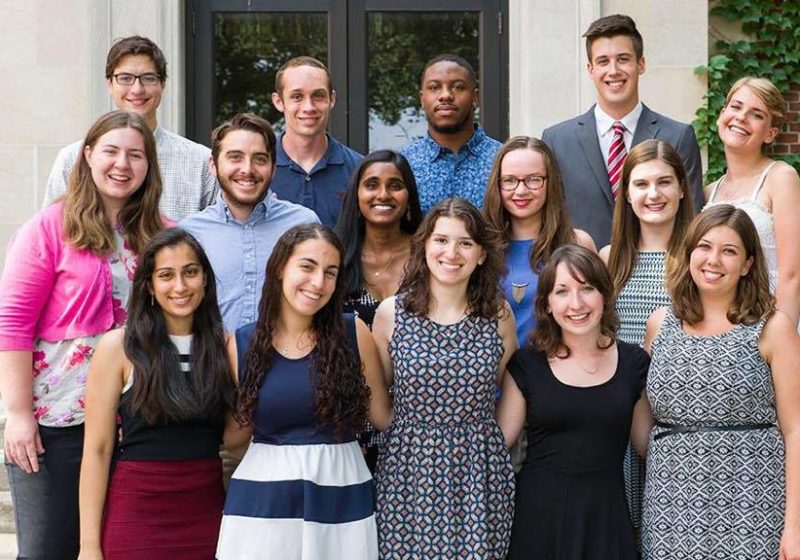On the first day of the Urban Fellows program this summer a founder of the Urban Fellows program noted his love for the transparent nature of Rochester. By the end of the 10-week, Rochester based program, the seventeen fellows agreed with that sentiment. With any preconceived notions shed after an intense, eye-opening and life changing summer, these Fellows –SUNY Geneseo, Emory, and Brown student, two Roberts Wesleyan students, and 12 UR students—are now spending their final weeks of the summer preparing for the fall semester and looking back on all they’ve learned and accomplished.
The program itself began in 2002 when a small group of students wanted to help engage their peers in civil service and community outreach. Working in a variety of fields and communities throughout the city of Rochester, the Urban Fellows Program has blossomed into a reputable and successful program that highlights civic engagement in neighborhoods through hands on interaction and service, and weekly educational sessions focused on urban issues and urban life.
According to senior Lindsey Feigenbaum, a Fellow this past summer, these weekly seminars “exhibit the type of learning that should make higher institutions unique” by using a combination of literature and theory paired with experiential learning opportunities. She emphasized “should” because the seminars allowed for new understanding and a clearer perspective of a way of life the Fellows had never experienced before, which is the goal of many lectures and courses, but one often left unaccomplished.
This imperative educational experience opened the eyes of fellows to the systemic discrimination and institutionalized racism present in our country today, according to sophomore Kavya Bana. The issues of segregated communities and systematic racism that disadvantages low-income African Americans in the job sector, houses, schools, and countless more areas, was one many Fellows hadn’t considered in depth, and hadn’t faced firsthand. One Wednesday in late June the Fellows were given direct insight into the topics of “Urban Crime and Justice”, which Feigenbaum said really opened her eyes to the reality of it, and found it one of the more difficult topics to confront.
Every following Thursday the Fellows found they were able to actually apply their learnings to their designated fellowships. Feigenbaum steered her meetings with her supervisor towards sharing what she had learned through the readings, reflections, discussions, and visits of the weekly seminars. During this time she worked to improve Cameron Community Ministries, a non-profit organization based in the Lyell-Otis neighborhood, by applying the knowledge of other work being done in Rochester concerning violence, crime, and employment opportunities for the patrons, as well as focusing on urban education during her fellowship as an assistant teacher for the program’s 5 to 12 year-old youth.
“Urban Fellows was really the way to fully break down the barrier between myself and the city that I had been holding up since I came to Rochester,” she reflected. Although many University of Rochester students are content in the comfortable bubble that the college offers, the Urban Fellowship Program offered an incredibly educational, and memorable way to exit that bubble for the betterment of Rochester.
“A huge takeaway from this experience for me was that it is not ‘charity’,” Bana said. “We are there to learn, to be a part of our community, to understand that the way we grew up, the way that the system usually favored us, is not the same or the case for everyone else. It is our responsibility as people that have obviously been privileged enough to be in a program like this at an institution like the University of Rochester.”
“I really want people to appreciate this city,” Bana added. Although the student’s interests are taken into account for their paid fellowships, the needs of the Rochester communities are at the forefront. Rochester was once a growing, bustling city living on the empires of Kodak, Xerox, and Bauch and Lomb, but has now struggled to revamp after the losses of factory jobs. Like many metropolitan areas, this has led to poverty, lacking public transport, failing public schools, residential segregation, and crime. Now, non-profits like the Rochester Urban Fellows are now working hard with the local government and community members to improve the city’s quality of life.
“Being able to start identifying myself as a community member has been, hands down, the best part of my work as a fellow,” Bana continued. Community participation is the key to lasting improvement in an area. Many Fellows reflected on how loving the Rochester community was, and this is clear at the variety of festivals and events that are held throughout the city. “Rochester has a thriving art and music scene that I doubt many students are aware of, that makes it stand-out among Northeastern metro areas, as well as one of the most amazing year-round Farmer’s Markets I’ve ever seen,” Bana said. The Fellows attended countless other events, such as Jazzfest in early August, Corn Hill arts festival, 19th Ward Square Fair, Greek Fest, a Poetry Slam at East High School, Aberdeen Square Fair, Reshaping Rochester lecture series ‘Equity by Design’ hosted by the Community Design Center of Rochester, a City Council Meeting, and a dinner with the previous UR Provost Peter Lennie. Feigenbaum found that every place she visited in the program left her with a sense of belonging and inspiration “whether it be Coffee Connection in the Southwedge supporting through employment women who are recovering substance abuse, or the Office of Innovation at City Hall which focuses on sustaining local jobs and systematizing community wealth building practices.”
“It was definitely life-changing,” she concluded, “and I wouldn’t trade the experience for anything. It really has shaped me, as well as the way I approach my goals everyday going forward.”


